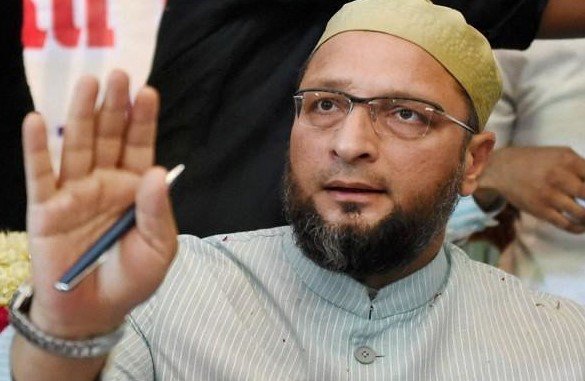In a sharp critique of Pakistan, All India Majlis-e-Ittehadul Muslimeen (AIMIM) leader Asaduddin Owaisi urged that Pakistan be reinstated on the Financial Action Task Force (FATF) grey list. His comments came amid growing concerns that Pakistan’s recent $2 billion loan from the International Monetary Fund (IMF) could be misused to fund military operations and terror groups, especially in the context of ongoing tensions with India.
Owaisi, who is part of an all-party delegation led by Bharatiya Janata Party MP Baijayant Panda for global anti-terrorism outreach, made the remarks during an interaction with the Indian diaspora in Kuwait on Monday. The delegation’s visit is part of broader efforts to rally international support against terrorism, particularly focusing on Pakistan’s alleged role in financing terror activities.
Pakistan’s Financial Activities Under Scrutiny
Owaisi emphasized that tighter financial scrutiny on Pakistan is crucial, arguing that placing Pakistan back on the FATF grey list would subject the country to stricter oversight in international money transactions. “The importance of the FATF grey list is that there will be huge scrutiny on that nation when you do money transactions,” he told reporters.
The FATF grey list includes countries with strategic deficiencies in anti-money laundering and counter-terrorism financing measures. Being on this list limits a country’s access to global financial markets and puts it under close watch. Pakistan was removed from the list last year, but many officials and analysts in India remain wary, fearing a relapse into financial laxity that could support illicit activities.
Pakistan’s alleged use of hawala networks and money laundering to sponsor terror groups remains a hot-button issue. Owaisi specifically pointed to Pakistan’s involvement in transferring funds through the Middle East, which have been linked to terror activities against India. This, he said, undermines peace efforts and poses a direct threat to Indian security.

Questioning Pakistan’s Religious Claims Against India
The AIMIM leader didn’t stop at financial matters. He also challenged Pakistan’s narrative of victimhood based on religious grounds. Owaisi highlighted that India’s Muslim population is substantially larger than Pakistan’s and argued that Islamabad has no grounds to raise religious issues to target India.
“Pakistan can’t take up this issue (of religion) and say India is somehow unfair to Muslims,” Owaisi said. His remarks echoed earlier criticisms of Pakistan’s attempts to frame India as a persecutor of Muslims, a line that many Indian politicians reject as a diplomatic smokescreen.
Political Context and International Reactions
Owaisi’s statements come at a time when India is intensifying its diplomatic efforts to isolate Pakistan on the global stage. The all-party delegation’s outreach in Gulf countries like Kuwait and Bahrain aims to highlight Pakistan’s role in supporting terror networks and pushing for a unified international stance against such activities.
The IMF’s $2 billion loan to Pakistan, while intended to stabilize the country’s struggling economy, has become a focal point of concern. Critics fear that the funds might not be fully used for economic reforms but could instead bolster Pakistan’s military expenditures or terror financing. Owaisi’s call to reinstate Pakistan on the FATF grey list fits into this wider narrative of suspicion and caution.
Meanwhile, Pakistan continues to deny allegations of supporting terrorism and insists its financial practices meet international standards. However, skepticism remains high among India and some allied countries, making the debate around FATF listing an ongoing diplomatic tug-of-war.
Understanding FATF’s Role in Global Finance
To put it plainly, FATF’s grey list isn’t just a bureaucratic tag. It’s a serious economic tool. Countries on the grey list face restrictions that impact their ability to borrow money, attract investment, and conduct cross-border transactions easily. For Pakistan, this means increased compliance costs and reduced financial flexibility.
Pakistan’s brief removal from the list had offered some economic relief, but concerns about backsliding into non-compliance persist. Owaisi’s demand for reinstatement is driven by the fear that the $2 billion IMF package may be diverted for non-economic purposes, exacerbating regional instability.
A Bigger Message to the Global Community
Owaisi’s vocal criticism in Kuwait sends a clear signal to the international community: India is watching closely and expects global partners to hold Pakistan accountable. By linking Pakistan’s financial actions with terrorism, he aims to frame the issue not just as a bilateral dispute but as a threat to global security.
His remarks also underscore the political divide within the region — while Pakistan pushes its narrative of victimhood and victimization, Indian politicians like Owaisi highlight accountability and transparency. It’s a reminder that economic aid, like IMF loans, often carries strings attached and can be a battleground for influence and power.
This issue is far from settled. As the all-party delegation continues its outreach, the spotlight on Pakistan’s financial conduct will remain intense. Will the IMF and FATF step up their monitoring? Will Pakistan face renewed sanctions? Time will tell.
But one thing’s certain — the conversation about Pakistan’s role in terrorism financing isn’t going away anytime soon. And voices like Owaisi’s are making sure the world keeps listening.
